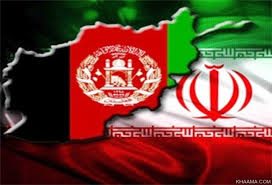RFLRE – A grainy video shows several police officers standing idly as an angry mob beats a young man.
The 30-second video, shared widely this week on social media, purportedly shows a group of Iranian men assaulting a young Afghan migrant.
The video is among several that have been uploaded on social media in recent days. While the authenticity of the viral videos has not been independently verified, the footage has sparked anger among Afghans and prompted a reaction from the Taliban-led government in Afghanistan.
The videos have put the spotlight on the mistreatment of Iran’s sizeable Afghan community. An estimated 3 million Afghans, mostly of them undocumented refugees, live in Iran.

That figure is swelling further as the Taliban’s repressive rule and the worsening economic and humanitarian crisis in Afghanistan drive thousands of people to flee the country every week. Iranian authorities have responded by tightening border controls and deporting scores of Afghans, often violently, every day.
“It is horrible, disgusting, and heartbreaking to see videos of how inhumanly Afghan migrants and refugees are being treated in Iran,” said Zaman Sultani, a South Asia researcher at Amnesty International. “All uses of violence against Afghans in Iran must be thoroughly investigated and perpetrators brought to justice.”
Humiliation And Violence
The videos include footage purportedly showing an unidentified Iranian man humiliating a distraught Afghan teenager.
“Say that you eat shit,” shouts the man in the grainy video. He then orders the Afghan teenager to repeatedly stand and sit.
Another viral video appears to show an Iranian driver grabbing an Afghan man by the arm and brandishing a box cutter. The driver forces the man to utter profanities against Afghans.

Meanwhile, another video appears to show the aftermath of an alleged mob attack on a car carrying Afghan migrants in the Iran’s central city of Yazd. The footage shows the smashed windows of the vehicle.
The emergence of the videos prompted a statement from the Taliban, the militant Islamist group that seized power in August.
“We urge the Islamic Republic of Iran not to harass Afghan refugees,” Taliban spokesman Zabihullah Mujahid told BBC Persian on April 5.
Mujahid also called on Tehran to stop forcibly deporting Afghan refugees and criticized the heavy-handed tactics of Iranian border guards, who have been accused of beating and harassing Afghan nationals.
Faizanullah Nasiri, a senior Taliban Foreign Ministry official, met with Iranian diplomats in Kabul on April 6 to discuss “the treatment of Afghans by [Iran’s] border forces and administrative officials,” according to a ministry spokesman.
Sultani said Amnesty International has documented cases of Iranian security forces beating Afghans trying to enter Iran. “It has resulted in pushbacks and injuries and sometimes death of Afghan people, which violates international law,” he said.
He said the deportations violate the international ban on returning people to countries where they are likely to be abused known as non-refoulement.
Sayed Abbas Badrifar, a media officer at the Iranian Embassy in Kabul, claimed the videos circulating on social media did not reflect reality and were aimed at undermining ties between the two neighboring countries.
“These videos cannot be used to judge the treatment of Afghan refugees in Iran,” he was quoted as saying by Afghanistan’s independent Tolo News channel.

Since seizing power, the Taliban has attempted to curry favor with Iran, a major trade partner and regional power.
Iranian Foreign Minister Hossein Amir-Abdollahian, speaking in China last week, said 5 million Afghans currently reside in Iran. He called on foreign donors and international organizations to “allocate new resources” for Afghan refugees in the country.
History Of Abuse
This is not the first time videos have emerged that appear to show the mistreatment of Afghan migrants in Iran.
In June 2020, Iranian police opened fire on a car carrying Afghan migrants, causing it to explode in flames. Three Afghans were killed and five wounded. Iranian authorities said police fired on the vehicle because they suspected it was carrying drugs and undocumented migrants.

A month earlier, dozens of Afghans illegally crossed into Iran and were detained by Iranian border guards who allegedly beat, tortured, and then forced them to jump into the Harirud, a 1,100-kilometer river shared by Afghanistan, Iran, and Turkmenistan. Many of them drowned.
The two events led Afghans to protest in the streets and on social media to denounce Iranian authorities.
International human rights groups have documented years of violations against Afghan refugees and migrants in Iran, including physical abuse, detention in unsanitary and inhumane conditions, forced payment for transportation and accommodation in camps, slave labor, and the separation of families.
In 2015, Iranian Supreme Leader Ayatollah Ali Khamenei issued a decree allowing all Afghan children to go to school. But Afghans are still denied many other basic services, including access to medical care, jobs, and housing.
- Abubakar SiddiqueAbubakar Siddique, a journalist for RFE/RL’s Radio Azadi, specializes in the coverage of Afghanistan and Pakistan. He is the author of The Pashtun Question: The Unresolved Key To The Future Of Pakistan And Afghanistan.
 Shabtabnews In this dark night, I have lost my way – Arise from a corner, oh you the star of guidance.
Shabtabnews In this dark night, I have lost my way – Arise from a corner, oh you the star of guidance.



